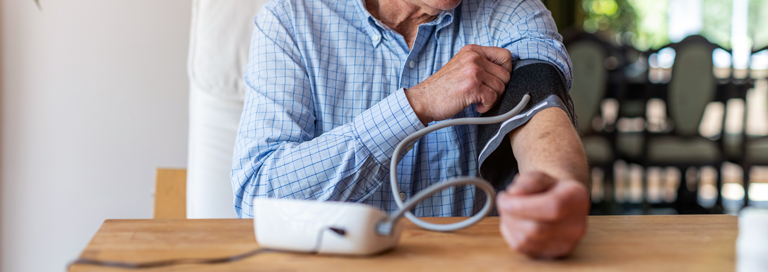As long as I’m a doctor, I will keep telling you about natural treatments and therapies that can save your life and protect your health.
And I’ll also continue to share real stories highlighting the damage caused by collusion between Big Pharma and mainstream medicine.
It recently happened to one of the researchers at my Wellness Foundation. She told me that her doctor wanted to put her on high blood pressure medication. When I asked how high her numbers were, she told me 135/88.
Now, this used to be considered a normal reading. But a few years ago, new guidelines from the American Heart Association (AHA) and the American College of Cardiology (ACC) lowered the numbers for the diagnosis of high blood pressure.
Overnight, nearly 31 million more people were considered “at great risk” and “in need of” hypertension medications, including:
-
- Calcium channel blockers. These cause your arteries to relax and dilate. This reduces blood pressure and improves circulation. At the same time, it slows the heart rate. Studies show that people taking calcium channel blockers have a 60% higher risk of a heart attack than those who use other blood pressure meds. Other side effects include headache, flushing, constipation, nausea, edema, and low blood pressure.
- ACE inhibitors. These drugs are designed to cause blood pressure to fall and the amount of blood pumped by the heart to increase. They are linked to severe reactions, including atrial fibrillation, kidney failure, and death.
- Diuretics. These simple water pills remove water from your blood. But they cause weakness, dizziness, muscle cramps, impotence, gouty arthritis, diarrhea, joint pain, and more.
- Beta-blockers. They block their response to norepinephrine, a hormone that tells the arteries to tighten and the heart to speed up. They lower blood pressure by slowing the heart and relaxing the blood vessels. But side effects include fatigue, dizziness, insomnia, nausea, depression, and loss of libido. Worse yet, they can even raise triglyceride levels and cause heart palpitations.
Of course, drug companies were thrilled with the guidelines. Suddenly, 63% of the population qualified as customers for their blood pressure pills.1
And the AHA did nothing to discourage doctors from prescribing medication to these potential new patients.
Why would they?
Six of the 15 members who wrote the new guidelines had financial ties to Big Pharma companies – including Merck, Pfizer, and AstraZeneca – who all happen to make drugs that treat hypertension.
These ties included everything from paid consulting positions to all-inclusive getaways at expensive resorts.
Of course, keeping blood pressure at optimal levels is vital for your health. High blood pressure can lead to heart attack, stroke, brain aneurysm, Alzheimer’s, and kidney failure. However, I consider blood pressure pills to be a last resort.
Luckily, there are different ways you can lower your blood pressure naturally. Here are two you can try today…
-
- Take my favorite supplement – CoQ10. This nutrient alone helps 50% of my patients get high blood pressure back to normal. Studies show boosting your CoQ10 can drop blood pressure an amazing 11 to 17 mmHg in systolic pressure and 8 to 10 mmHg in diastolic pressure.2 In another study, adding just 120 mg/day of CoQ10 for eight weeks in patients with high blood pressure and coronary artery disease decreased systolic pressure by an average of 12 mmHg and diastolic pressure by an average of 6 mmHg compared to a placebo.3 I recommend taking 100 mg daily until your blood pressure is controlled. At that point, you can drop to 60 mg. And make sure you take the ubiquinol form of CoQ10 — it’s the most potent.
- Use the sleep hormone to reduce blood pressure. Melatonin dilates blood vessels and inhibits the fight-or-flight stress reaction in the hypothalamus. Recent research found that melatonin significantly reduced both nocturnal and morning blood pressure on average 8/3.5 mm Hg for systolic blood pressure/ diastolic pressure, respectively.4 A second study found melatonin lowered systolic blood pressure by about 6 mm/Hg and diastolic pressure by 4 mm/ Hg.5 Not surprisingly, the studies also indicate that melatonin improves sleep quality, which allows the body to relax more. But they also show that melatonin is involved in biochemical reactions influencing blood pressure levels.
To Your Good Health,

Al Sears, MD, CNS
References:
1. Khera R, et al. “Impact of 2017 ACC/AHA guidelines on prevalence of hypertension and eligibility for antihypertensive treatment in the United States and China: a nationally representative cross-sectional study.”BMJ 2018;362:k2357
2. Rosenfeldt FL, et al. “Coenzyme Q10 in the treatment of hypertension: a meta-analysis of the clinical trials.” J Hum Hypertens. 2007;21(4):297-306.
3. Singh RB, et al. “Effect of hydrosoluble coenzyme Q10 on blood pressures and insulin resistance in hypertensive patients with coronary artery disease.” J Hum Hypertens. 1999;13(3):203-208.
4. Gubin D, et al. “Daily melatonin administration attenuates age-dependent disturbances of cardiovascular rhythms.” Curr Aging Sci. 2016;9(1):5-13.
5. Cheer FA, et al. “Daily nighttime melatonin reduces blood pressure in male patients with essential hypertension.” Hypertension. 2004;43(2):192-197.

